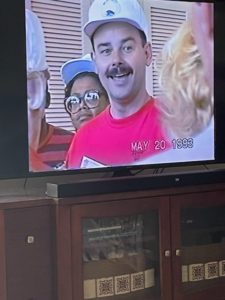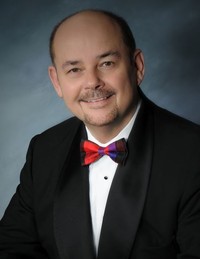
Joe Gillie leading the All America City effort in 1993.
Over the holidays, we spent some time in the 1990s.
We took the trip back through home movies. It was quite an experience.
This is not a usual “thing” for us, but my ex-wife was in town for Christmas, and she gave us all flash drives filled with memories. It was a wonderful gift and deeply appreciated.
We got to “visit” with relatives since departed and hear voices that we miss so much that our hearts literally ache.
We got to see our children when they were little. It was great.
We were reminded once again of how fast life flies by. The home movie experience makes you nostalgic for what seemed like a simpler time.
It’s the everyday stuff that tugs on your heart; seeing your son dig into his first birthday cake (with his hands). Seeing your now grown daughter hugging a long departed beloved pet. Savor these fleeting scenes….they drift into the mist as the days pass by.
As a new year begins, I think that’s a good message to hold onto. Cherish the good stuff. Hold onto hope in this crazy world.
The home movie binge led us an old video of Delray’s 1993 All America City Award win in Tampa.
It was the city’s first win and the victory put Delray on the map nationally. But more importantly, the All America City designation gave the many citizens who were working to build this community the validation that they were on the right track.
A distinguished group of judges—people who knew cities and asked tough questions—took a look at what Delray was doing and gave the city an enthusiastic thumbs up.
My wife, Diane, then the city’s assistant planning director, filmed the event and we think it may be the only video that exists. We’re not sure why, but I guess nobody thought of filming the event.
Viewed today, almost 30 years later, it’s clear that what happened in Tampa was important local history and I think it ought to be required viewing for anyone interested in what it takes to build community and instill civic pride.
Now as good an urban planner as my wife was, she was not exactly an auteur behind the lens. Scorcese she is not. (Sorry, Diane).
Still, she managed to capture the spirit of this community circa 1993 and that spirit was awe-inspiring.
A few things jump out.
—City government was close to its residents.
Neighborhood leaders and the city partnered on a wide range of projects. The Police Department, under the leadership of Chief Rick Overman, was taking community policing to new heights working closely with the grass roots group MAD DADS to take back entire neighborhoods from drug dealers. That effort became legendary, but the video also reveals how integrated the efforts were with the rest of city government. The Community Improvement Department, led by Lula Butler, worked hand in hand with the Planning Department and other city departments to move the needle on blight, crime, and quality of life issues. In those days, everything seemed to be interlocked and when people, systems and organizations are rowing in the same direction you can move mountains. And Delray did.
–There was a laser focus on schools.
When one of the All America City judges asked a tough question about local schools, up came School Board member Bill Graham to testify to the city’s close partnership with the School District. Pretty cool. Delray was a model for other cities on how to partner with the School Board to make meaningful change and they did with new schools (Village Academy), award winning programs (S.D. Spady’s Montessori magnet) and improved facilities (a new Atlantic High School which was built about a decade after the ‘93 All America City Award).
—There was extraordinary camaraderie among citizens.
My favorite parts of the video footage is to see Delray’s diverse community interacting in candid moments. Old and young, Black and white, east and west—there was a real closeness and ease that was evident in those days. Everyone was on board with a common vision. They all shared the same North Star and that’s magical to witness.
I, for one, took that part for granted. Delray was built on vision. Public engagement and involvement was what crafted that vision.
We have gotten away from that and it has caused all sorts of problems.
But in 1993, the community was unified behind Visions 2000 and the Decade of Excellence bond which provided the financing for all sorts of public investments. The citizens backed those efforts because they created the vision and then voted overwhelmingly to fund it.
Those investments yielded an immense return. For the life of me, I will never understand why recent commissions haven’t taken advantage of historically low interest rates (and record tax revenues to satisfy debt) to invest in our infrastructure which is aging and in need of repair.
There’s one more factor that hit me as the camera scanned the crowd and I saw the likes of Frances Bourque, Ken Ellingsworth, Dave Harden, Chris Brown, Tom Fleming, David Kovacs, Robin Smith, Deborah Dowd, Chuck Ridley, Spencer Pompey, Ruth Pompey, Tom Lynch, Jay Alperin, David Kovacs, Helen Coopersmith, Sandra Almy, Ben Bryant, Bob Currie, Dorothy Ellington, Leo Erbstein, Dave Henninger, Mike Weiner, Frank McKinney, Sandy Simon, John Tallentire, Bill Wood and so many others.
These were some really, really special people. The kind of people who move mountains.
All these folks were very different, but they were united in their love for this city, and they gave their time, talents and treasure to Delray Beach.
I have no doubt that we still have some amazing talent and passion in our city. I see it every day.
But in my opinion our city government is no longer doing the outreach to get people involved. So many people feel adrift as a result.
And it can’t all be blamed on Covid. This drift has been going on long before we heard the word.
We are suffering from a lack of leadership and vision—that’s fatal my friends. Fatal, with a capital F. And if it doesn’t change, you can use that letter to describe what we will be.
We long ago ditched the Town Hall meeting, charrettes and visioning sessions. Now our chances to engage with the city are few and far between and some people have been cancelled because they don’t support the current regime. (see Square, Old School for a prime example).
This isn’t a healthy or productive way to run a city. And the evidence is everywhere (See, turnover and lawsuits for example).
There is a better way.
Sometimes you should look to the past for clues. It is no longer than the 90s. That’s clear. The world has changed.
But some basics never grow old. Kindness, friendship, outreach, engagement and a sincere desire to enlist the community to tackle its challenges will never go out of style. That’s what made us an All America City when that really meant something.
I’ve long ago given up on a few elected officials. Thanks to term limits they will all go some day. But we have a new City Manager. I think he’s the ninth or 50th since Dave Harden retired, I forget which because it has been dizzying to watch. But maybe this one will stick around.
If he’s willing, he ought to spend 20 minutes or so watching the video from 1993. He might get a glimpse of a town that was really working back in those days. He might just learn something.
Email me Mr. Moore. I will make sure you get a copy. I will even find someone who understands what it takes to build community to sit with you (at a respectful social distance of course) and narrate. I suspect you are getting a very one-sided view of what Delray is like. Perhaps you should balance that out.
There are still a few icons from that era who I’m sure would be happy to help you.





